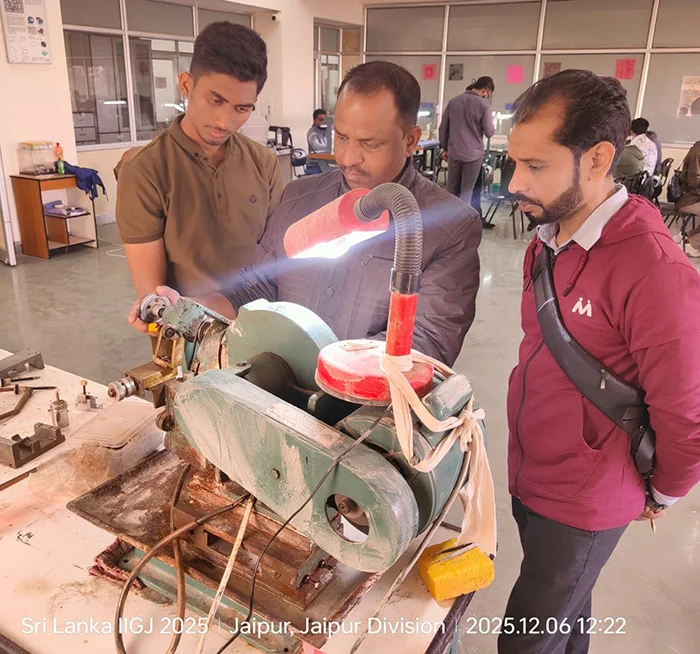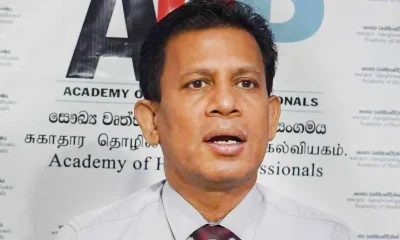Business
CIPM Webinar on Managing Employee Wellbeing for High Performance Attracts Over 200 Participants

CIPM Sri Lanka – the Nation’s leader in human resource management recently organized a bilingual webinar to share expert insights on “Managing Employee Wellbeing for High Performance in the Workplace”. The evening webinar attracted over 200 enthusiastic participants. Moderated by Ken Vijayakumar-Vice President CIPM Sri Lanka and Director HR, Waters Edge the expert speaker panel comprised of Mrs. Davina Kern-Head of Group HR, David Pieris Holdings (Pvt) Ltd, Dr Thivanka Munasinghe-Family Physician and Dr Heather Fernando-AGM HR, Metropolitan Technologies (Pvt) Ltd.
“In the context of the far-reaching effects of the pandemic, there is no doubt that employee wellbeing was affected. HR practitioners should take the lead to ensure that the enabling environment for employee high performance and engagement is maintained with innovative, out of the box thinking to care for their employees’ wellbeing thereby overcoming the challenges in the new normal,” said Ken Vijayakumar.
At the outset, the panelists presented their views on many interesting and important areas including the definition of employee wellbeing in the context of HRM, importance of employee wellbeing for HR practitioners and professionals, best practices for employee wellbeing adopted by organizations during the pandemic, how employee wellbeing adds value to organizational performance and future strategies that can be adopted for employee wellbeing.
Explaining that employee wellbeing is the way employees’ work, with their expectations, with workplace affects on their overall health and happiness, Dr. Thivanka Munasinghe said that the state of being comfortable with good health was dependent on the employees emotional, career, social, financial, and physical status which are known as the 5 pillars of wellbeing. “By understanding & listening to our employees we can improve their happiness and the sense of wellbeing. Eventually, they will give an improved and increased productivity for the organization” he added.
Sharing her views, Dr Heather Fernando said that employee wellbeing is a state of psychological element that is shaped by engagement, their work expectations, and how their overall health and happiness is managed by the employer. “HR professionals should strategically leverage on-site resources to generate a healthier and happier workforce that contributes with high productivity for high profitability. Human capital is the heart of a successful organization specially in tough economic times. Therefore, having a happy and healthy workforce could bring high economic values to the bottom line” adding that during these unfamiliar times there is no doubt that employee wellbeing is a growing concern.
Davina Kern said “everyone feared the deadly Covid-19. All employees needed an understanding setting to perform. Bosses, colleagues who are accommodative, who are there in need. Covid-19 took a toll on mental wellbeing of everyone. HR needs to be able to decide which task to be assigned to whom based on competencies. Companies who understood what really mattered to them focused on priorities and won people, customers and revenue” and emphasized that post pandemic it was important for HR to take a leadership role to help employees reconnect in an environment of coming back to office and supporting them to work remotely in terms of improving competencies required.
Business
Real economic data isn’t in a report: It’s on a bargain table

If you want to understand Sri Lanka’s economy, don’t start with reports from the Ministry of Finance or the Central Bank. Go instead to a crowded clothing sale on the outskirts of Colombo.
In places like Nugegoda, Nawala, and Maharagama, temporary year-end sales have sprung up everywhere. They draw large crowds – not just bargain hunters, but families carefully planning every rupee. People arrive with SMS alerts on their phones and fixed budgets in their minds. This is not casual shopping. It is a public display of resilience, a tableau of how people are coping.
Tables are set up in parking lots and open halls, clothes spilling from cardboard boxes. When new stock arrives, hands reach in immediately – young and old, men and women – searching for the right size, the least faded colour, the smallest flaw that justifies the price. Everyone is heard negotiating, not with desperation, but with a quiet, shared dignity.
“Look at the prices in the malls, then look here,” says a middle-aged mother shopping for school uniforms in Maharagama. “This isn’t shopping for enjoyment. This is about managing life.” Food prices have already stretched her household budget thin. Here, she can buy trousers for half the usual price.
Women, often the household’s purchasing managers, move with determined efficiency. Men are just as involved – checking stiches, comparing prices, trying shirts over their own clothes. Inflation, here, wears the same face on everyone.
Bright banners promise “Trendy Styles!”, but most shoppers know better. These are last season’s clothes, cleared out to make room for next year’s stock. Still, no one feels embarrassment. “New” now simply means something you didn’t own before; the label matters far less than the price.
Not all items are discounted equally. Essentials – work trousers, denims, track pants – are only slightly cheaper. Sellers know these will sell regardless. The steepest discounts are reserved for the items people can almost afford to skip.
This is economic data you won’t find in official reports. Here, inflation is measured in real time. A young man studies a shirt’s price tag and calculates how many days of work it represents. Friends debate whether a slight fade is a fair trade for the price. Every transaction is a careful calculation.
Year-end sales have always existed. But since the economic crisis, they have taken on a new, grim significance. They offer a slight reprieve to households learning to steadily lower their aspirations. While the government speaks of fiscal discipline and a steady Treasury, everyday life remains a tightrope walk.
The Central Bank measures inflation in percentages. On the streets of Kiribathgoda, it is measured in trade-offs: one item instead of two; buying now or waiting for the Avurudu season; choosing need over want, again and again.
As evening falls, the crowds thin. The tables are left rumpled, hangers scattered like fallen leaves. Yet these spaces tell a story more powerful than any quarterly report – a story of business ingenuity, household struggle, and an economy where every single purchase is weighed with immense care.
In that careful weighing lies a quiet, unsettling truth. No matter what is said about replenished reserves or balanced budgets, these bargain tables – if they could speak – would tell the nation’s most heart-rending story. And they do, to anyone who chooses to listen.
By Sanath Nanayakkare
Business
Global economy poised for growth in 2026, says Goldman Sachs, despite uneven job recovery

The global economy is forecast to expand by a “sturdy” 2.8% in 2026, exceeding consensus expectations, according to the latest Macro Outlook report from Goldman Sachs Research. This optimistic projection highlights a resilient recovery trajectory across major economies, albeit with significant regional variations and a persistent disconnect with labour market strength.
Goldman Sachs economists are most bullish on the United States, expecting GDP growth to accelerate to 2.6%, substantially above consensus estimates. This optimism stems from anticipated tax cuts, easier financial conditions, and a reduced economic drag from tariffs. The report notes that consumers will receive approximately an extra $100 billion in tax refunds in the first half of next year, providing a front-loaded stimulus. A rebound from the past government shutdown is also expected to contribute to what chief economist Jan Hatzius predicts will be “especially strong GDP growth in the first half” of 2026.
China’s economy is projected to grow by 4.8%, underpinned by robust manufacturing and export performance. However, economists caution that parts of the domestic economy continue to show weakness. In the euro area, growth is forecast at a modest 1.3%, supported by fiscal stimulus in Germany and strong growth in Spain, despite the region’s longer-term structural challenges.
A key concern outlined in the report is the stagnant global labour market. Job growth across all major developed economies has fallen well below pre-pandemic 2019 rates. Hatzius links this weakness partly to a sharp downturn in immigration, which has slowed labour force growth, with the disconnect being most pronounced in the United States.
While artificial intelligence (AI) dominates technological discourse, Goldman Sachs economists believe its broad productivity benefits across the wider economy are still several years away, with impacts so far largely confined to the tech sector.
Business
India trains Sri Lankan gem and jewellery artisans in landmark capacity-building programme

A 20-member delegation of professionals from Sri Lanka’s Gem and Jewellery sector visited India from 1–20 December 2025 to participate in a specialised Training and Capacity Building Programme. The delegation represented the gemstone cutting and polishing segments of Sri Lanka’s Gem and Jewellery industry.
The programme was organised pursuant to the announcement made by Prime Minister of India, Narendra Modi, during his visit to Sri Lanka in April 2025, under which India committed to offering 700 customised training slots annually for Sri Lankan professionals as part of ongoing bilateral capacity-building cooperation.
The 20-day training programme was conducted by the Government of India at the Indian Institute of Gem & Jewellery, Jaipur, Rajasthan. The curriculum comprised a comprehensive set of technical and thematic sessions covering the entire Gem and Jewellery value chain. Key modules included cleaving and sawing, pre-forming, shaping, cutting and faceting, polishing, quality assessment, and industry interactions, aimed at strengthening practical skills and enhancing design and production capabilities.
As part of the experiential learning component, the participants undertook site visits to leading gemstone manufacturing units, gaining first-hand exposure to contemporary production technologies, design development processes, and modern retail practices within India’s Gem and Jewellery ecosystem.
The specialised training programme contributed meaningfully to strengthening professional competencies, promoting knowledge exchange, and deepening institutional and industry linkages in the Gem and Jewellery sector between India and Sri Lanka, reflecting the continued commitment of both countries to capacity building and people-centric economic cooperation.
-

 News7 days ago
News7 days agoMembers of Lankan Community in Washington D.C. donates to ‘Rebuilding Sri Lanka’ Flood Relief Fund
-

 News5 days ago
News5 days agoBritish MP calls on Foreign Secretary to expand sanction package against ‘Sri Lankan war criminals’
-

 Features7 days ago
Features7 days agoGeneral education reforms: What about language and ethnicity?
-

 News7 days ago
News7 days agoSuspension of Indian drug part of cover-up by NMRA: Academy of Health Professionals
-

 Sports5 days ago
Sports5 days agoChief selector’s remarks disappointing says Mickey Arthur
-

 News4 days ago
News4 days agoStreet vendors banned from Kandy City
-

 Editorial7 days ago
Editorial7 days agoA very sad day for the rule of law
-

 News7 days ago
News7 days agoUS Ambassador to Sri Lanka among 29 career diplomats recalled













